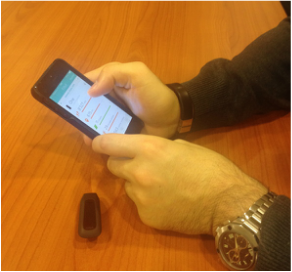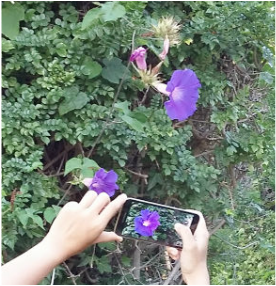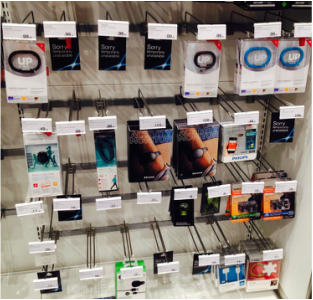(This page will be updated with my most recent projects soon...)
Disease Management
Designing Social Fitness Applications for Obese and Diabetic Patients
|
Social incentives such as cooperation and competition are found to motivate users in pervasive fitness applications. This work investigates how social incentives work for individuals with obesity and diabetes. We used a mobile fitness application called HealthyTogether as an experimental platform, which allows dyads to achieve fitness goals together and compete in an online community. We conducted a four-week study with 16 obese and diabetic patients who used HealthyTogether to exercise with a buddy. Results show that participants exercised more with social incentives compared with their baseline. Collaborating with buddies to compete in a community was reported as motivating for dyads exercising with strong ties. Social interactions could be demotivating between dyads who did not know each other well. Finally, it is crucial to consider patients’ technical literacy when designing behavior-changing technologies.
|
Publications:
- Yu Chen, Yunan Chen, Mirana Randriambelonoro, Antoine Geissbuhler and Pearl Pu. Design Considerations for Social Fitness Applications: Comparing Chronically Ill Patients and Healthy Adults. The 20th ACM Conference on Computer-Supported Cooperative Work and Social Computing (CSCW 2017)
- Mirana Randriambelonoro Michelle, Yu Chen and Pearl Pu. Fitness tracking technologies for diabetic and obese patients: dynamics of behavior and requirement changes. IEEE Computer Magazine. SI: March 2017 Quality-of-Life Technologies(forthcoming)
- Yu Chen, Yunan Chen, Mirana Randriambelonoro, Antoine Geissbuhler and Pearl Pu. Peer Influence on the Engagement of Fitness Tracker Usage: A Diabetic and Obesity Study. IEEE International Conference on Healthcare Informatics 2016
- Yu Chen*, Mirana Randriambelonoro*, Antoine Geissbuhler and Pearl Pu. Social Incentives in Pervasive Fitness Apps for Obese and Diabetic Patients. In Proceedings of 19th ACM Conference Companion on Computer Supported Cooperative Work & Social Computing (CSCW’16 Companion), 2016 (*equal contribution)
- Mirana Randriambelonoro*, Yu Chen*, Antoine Geissbuhler and Pearl Pu. Exploring physical activity monitoring devices for diabetic and obese patients. In Adjunct Proceedings of the 2015 ACM International Joint Conference on Pervasive and Ubiquitous Computing and Proceedings of the 2015 ACM International Symposium on Wearable Computers (UbiComp/ISWC’15 Adjunct), 2015 (*equal contribution)
- Yu Chen, Yunan Chen, Mirana Randriambelonoro, Antoine Geissbuhler and Pearl Pu. Design Considerations for Social Fitness Applications: Comparing Chronically Ill Patients and Healthy Adults. The 20th ACM Conference on Computer-Supported Cooperative Work and Social Computing (CSCW 2017)
- Mirana Randriambelonoro Michelle, Yu Chen and Pearl Pu. Fitness tracking technologies for diabetic and obese patients: dynamics of behavior and requirement changes. IEEE Computer Magazine. SI: March 2017 Quality-of-Life Technologies(forthcoming)
- Yu Chen, Yunan Chen, Mirana Randriambelonoro, Antoine Geissbuhler and Pearl Pu. Peer Influence on the Engagement of Fitness Tracker Usage: A Diabetic and Obesity Study. IEEE International Conference on Healthcare Informatics 2016
- Yu Chen*, Mirana Randriambelonoro*, Antoine Geissbuhler and Pearl Pu. Social Incentives in Pervasive Fitness Apps for Obese and Diabetic Patients. In Proceedings of 19th ACM Conference Companion on Computer Supported Cooperative Work & Social Computing (CSCW’16 Companion), 2016 (*equal contribution)
- Mirana Randriambelonoro*, Yu Chen*, Antoine Geissbuhler and Pearl Pu. Exploring physical activity monitoring devices for diabetic and obese patients. In Adjunct Proceedings of the 2015 ACM International Joint Conference on Pervasive and Ubiquitous Computing and Proceedings of the 2015 ACM International Symposium on Wearable Computers (UbiComp/ISWC’15 Adjunct), 2015 (*equal contribution)
Mental Wellbeing
Promoting Positive Emotions through Smartphone Photography
|
With the increasing quality of smartphone cameras, taking photos has become ubiquitous. This paper investigates how smartphone photography can be leveraged to help individuals increase their positive affect. Applying findings from positive psychology, we designed and conducted a four-week study with 41 participants. Participants were instructed to take one photo every day in one of the following three conditions: a selfie with a smiling expression, a photo of something that would make oneself happy, and a photo of something that would make another person happy. After three weeks, participants’ positive affect in all conditions increased. Those who took photos to make others happy became significantly less aroused. Qualitative results showed that the selfie group observed changes in their smile over time; the group taking photos to improve their own affect became more reflective, and those taking photos for others found that connecting with family members and friends helped to relieve stress.
|
Publications:
Yu Chen, Gloria Mark, Sanna Ali, Xiaojuan Ma. Unpacking Happiness: Lessons from Smartphone Photography among College Students. The Fifth IEEE International Conference on Healthcare Informatics (ICHI 2017) (forthcoming)
Yu Chen, Gloria Mark, Sanna Ali. Promoting Positive Affect through Smartphone Photography. Psychology of Well-Being: Theory, Research and Practice, 2016
Yu Chen and Gloria Mark. Positive Psychology in Photography and Social Media. CHI2016 Computing and Mental Health Workshop, 2016
Clara Marques Caldeira, Yu Chen, Lesley Chan, Viviam Pham, Yunan Chen, Kai Zheng. Mobile apps for mood tracking: an analysis of features and user reviews. AMIA 2017 Annual Symposium - American Medical Informatics Association, 2017 (forthcoming)
Yu Chen, Gloria Mark, Sanna Ali, Xiaojuan Ma. Unpacking Happiness: Lessons from Smartphone Photography among College Students. The Fifth IEEE International Conference on Healthcare Informatics (ICHI 2017) (forthcoming)
Yu Chen, Gloria Mark, Sanna Ali. Promoting Positive Affect through Smartphone Photography. Psychology of Well-Being: Theory, Research and Practice, 2016
Yu Chen and Gloria Mark. Positive Psychology in Photography and Social Media. CHI2016 Computing and Mental Health Workshop, 2016
Clara Marques Caldeira, Yu Chen, Lesley Chan, Viviam Pham, Yunan Chen, Kai Zheng. Mobile apps for mood tracking: an analysis of features and user reviews. AMIA 2017 Annual Symposium - American Medical Informatics Association, 2017 (forthcoming)
Press (selected):
KPCC (NPR affliated Radio). Radio interview. Can a smiling selfie a day lead to a happier life? Sept. 16, 2016
MedicalResearch. Taking Happy Photos Can Improve Mood and Reduce Stress. Sept. 15, 2016
KPCC (NPR affliated Radio). Radio interview. Can a smiling selfie a day lead to a happier life? Sept. 16, 2016
MedicalResearch. Taking Happy Photos Can Improve Mood and Reduce Stress. Sept. 15, 2016
Physical Wellbeing
Designing Social Incentives for Mobile Fitness Applications
|
A crucial element in many mobile fitness applications is gamification that makes physical activities fun. While many methods focus on competition and individual users’ interaction with the game, the aspect of social interaction and how users play games together in a group remains an open subject. To investigate these issues, we developed a mobile game, HealthyTogether, to understand how users interact in different group gamification settings: competition, cooperation, social accountability, and teamwork. We conducted a series of user studies involving 40 dyads (N=80) over a period of two months. Results show that users significantly enhanced physical activities using HealthyTogether compared with when they exercised alone . Among the group settings, cooperation outperformed competition; social accountability helps users to enhance their relationship. Furthermore, physical activities are positively correlated with the number of messages they exchanged. Finally, we derive a set of design guidelines for social interfaces and incentives for mobile fitness applications.
|
Publications:
- Xinning Gui, Yu Chen, Clara Marques Caldeira, Dan Xiao, Yunan Chen. When Fitness Meets Social Networks: Investigating Fitness Tracking and Social Practices on WeRun. The ACM Conference on Human Factors in Computing Systems 2017 (CHI 2017)
- Yu Chen and Pearl Pu. HealthyTogether: Exploring Social Incentives for Mobile Fitness Applications. The second International Symposium of Chinese CHI 2014
- Yu Chen, Jiyong Zhang and Pearl Pu. Exploring Social Accountability in Pervasive Fitness Apps. The 8th International Conference on Mobile Ubiquitous Computing, Systems, Services and Technologies (UBICOMM2014), 2014
- Xinning Gui, Yu Chen, Clara Marques Caldeira, Dan Xiao, Yunan Chen. When Fitness Meets Social Networks: Investigating Fitness Tracking and Social Practices on WeRun. The ACM Conference on Human Factors in Computing Systems 2017 (CHI 2017)
- Yu Chen and Pearl Pu. HealthyTogether: Exploring Social Incentives for Mobile Fitness Applications. The second International Symposium of Chinese CHI 2014
- Yu Chen, Jiyong Zhang and Pearl Pu. Exploring Social Accountability in Pervasive Fitness Apps. The 8th International Conference on Mobile Ubiquitous Computing, Systems, Services and Technologies (UBICOMM2014), 2014
Press:
RTS Un (Swiss national television channel). Mon smartphone me coache (My coach on smartphone). Nov. 12, 2012.
RTS Un (Swiss national television channel). Mon smartphone me coache (My coach on smartphone). Nov. 12, 2012.
Social Wellbeing
Empatheticons: Designing Emotion Awareness Tools for Group Music Experience
|
Online group music players provide music playlists for a group of people. In such systems, group members sometimes listen to group songs individually. How to create the sense of connectedness for members who are listening to music in different time and locations is understudied. In this paper, we investigate the roles of emotion awareness tools and how they may enable connectedness. We first describe the design of empatheticons, a set of kinetic emotion representations. We then show that they allow users to represent, annotate, and visualize group members’ emotions in GroupFun, a group music player. An in-depth user study (N = 18) with GroupFun demonstrates that empatheticons enhance users’ perceptions of the connectedness (immediacy) and familiarity (intimacy) with each other in a non-collocated and asynchronous setting. Furthermore, users’ emotion annotation for group songs can be influenced by other group members. We conclude with design implications and directions for future research.
|
Publications:
- Yu Chen, Xiaojuan Ma, Alfredo Cerezo and Pearl Pu. Empatheticons: Designing Emotion Awareness Tools for Group Recommenders. In the 15th International Conference on Human Computer Interaction (Interaccion2014), 2014
- Yu Chen and Pearl Pu. CoFeel: Using Emotions to Enhance Social Interaction in Group Recommender Systems. Alpine Rendez-Vous (ARV) 2013 Workshop on Tools and Technology for Emotion-Awareness in Computer Mediated Collaboration and Learning, 2013
- Yu Chen, Xiaojuan Ma, Alfredo Cerezo and Pearl Pu. Empatheticons: Designing Emotion Awareness Tools for Group Recommenders. In the 15th International Conference on Human Computer Interaction (Interaccion2014), 2014
- Yu Chen and Pearl Pu. CoFeel: Using Emotions to Enhance Social Interaction in Group Recommender Systems. Alpine Rendez-Vous (ARV) 2013 Workshop on Tools and Technology for Emotion-Awareness in Computer Mediated Collaboration and Learning, 2013
Designing Social Interfaces for Group Recommender Systems
|
Group recommender systems help users to find items of interest collaboratively. Support for such collaboration has been mainly provided by interfaces that visualize membership awareness, preference awareness and decision awareness. However, these mechanisms do not address group influence issues: how members may affect each other. In this project, we investigate the roles of emotion awareness interfaces and how they may enable positive group influence. We first describe the design process behind an emotion annotation tool, which we call CoFeel. We then show that it allows users to annotate and visualize group members’ emotions in GroupFun, a group music recommender. An in-depth pilot user study with GroupFun suggests that emotion awareness features have the potential to enable group influence on preferences among group members. Most importantly, users reported CoFeel as a promising tool to annotate group recommended items in terms of accuracy and engagement. Finally, we provide design implications for emotion awareness interfaces in group recommender systems.
|
Publications:
- Yu Chen and Pearl Pu. Designing Emotion Awareness Interface for Group Recommender Systems. The 12th ACM International Working Conference on Advanced Visual Interfaces (AVI 2014), 2014
- Zerrin Yumak-Kasap, Yu Chen and Pearl Pu. EmoSoNet: An Emotion-aware Social Network for Emotional Wellbeing. In Proceedings of ACM SIGCHI 2012 Workshop on Interaction Design and Emotional Wellbeing, 2012
- Yu Chen and Pearl Pu. CoFeel: Emotional Social Interface in Group Recommender Systems. In Proceeding ofRecSys’12 Workshop on Interfaces for Recommender Systems, in conjunction with the 6th ACM Conference on Recommender Systems (RecSys’12), 2012
- Yu Chen and Pearl Pu. Do You Feel How We Feel? An Affective Interface in Social Group Recommender Systems. In Procedding of the 3rd Workshop on Recommender Systems and the Social Web (RSWEB’11), in conjunction with the 5th ACM Conference on Recommender Systems (RecSys’11), 2011
- Yu Chen and Pearl Pu. Designing Emotion Awareness Interface for Group Recommender Systems. The 12th ACM International Working Conference on Advanced Visual Interfaces (AVI 2014), 2014
- Zerrin Yumak-Kasap, Yu Chen and Pearl Pu. EmoSoNet: An Emotion-aware Social Network for Emotional Wellbeing. In Proceedings of ACM SIGCHI 2012 Workshop on Interaction Design and Emotional Wellbeing, 2012
- Yu Chen and Pearl Pu. CoFeel: Emotional Social Interface in Group Recommender Systems. In Proceeding ofRecSys’12 Workshop on Interfaces for Recommender Systems, in conjunction with the 6th ACM Conference on Recommender Systems (RecSys’12), 2012
- Yu Chen and Pearl Pu. Do You Feel How We Feel? An Affective Interface in Social Group Recommender Systems. In Procedding of the 3rd Workshop on Recommender Systems and the Social Web (RSWEB’11), in conjunction with the 5th ACM Conference on Recommender Systems (RecSys’11), 2011
Designing Pervasive Social Networking Applications
|
I studied pervasive social networks to understand how strangers in the same location could share resources with trusted users. I prototyped two privacy-enhanced pervasive social networking applications that help users make content queries among strangers in the same places and to communicate with trusted strangers nearby. My research demonstrated that with a privacy-enhanced reputation system, users can interact with strangers within location proximity effectively. This is one of the pioneering works in pervasive social networking applications. The follow-up research prototypes are being integrated in smartphone manufactures, and could be potentially applied in car-sharing and group buying services
|
Publications:
- Zheng Yan, Yu Chen and Yue Shen. PerContRep: A Practical Reputation System for Pervasive Content Services. Journal of Supercomputing. Springer, 2014
- Zheng Yan, Yu Chen and Yue Shen. A practical reputation system for pervasive social chatting. Journal of Computer and System Sciences, 2013
- Yu Chen, Zheng Yan and Valtteri Niemi. Implementation of a Reputation System for Pervasive Social Networking. In Proceeding of In Proceeding of IEEE 11th International Conference on Trust, Security and Privacy in Computing and Communications (TrustCom), 2011
- Zheng Yan and Yu Chen. AdChatRep: a Reputation System for MANET Chatting. In Proceedings of the 1st International Symposium on Social and Community Intelligence (SCI’11), in conjunction with the 13th ACM International Conference on Ubiquitous Computing (Ubicomp’11), 2011
- Zheng Yan and Yu Chen. AdContRep: A privacy enhanced reputation system for MANET content services. Inthe 7th International Conference on Ubiquitous Intelligence and Computing (UIC’11), 2011
- Zheng Yan, Yu Chen and Yue Shen. PerContRep: A Practical Reputation System for Pervasive Content Services. Journal of Supercomputing. Springer, 2014
- Zheng Yan, Yu Chen and Yue Shen. A practical reputation system for pervasive social chatting. Journal of Computer and System Sciences, 2013
- Yu Chen, Zheng Yan and Valtteri Niemi. Implementation of a Reputation System for Pervasive Social Networking. In Proceeding of In Proceeding of IEEE 11th International Conference on Trust, Security and Privacy in Computing and Communications (TrustCom), 2011
- Zheng Yan and Yu Chen. AdChatRep: a Reputation System for MANET Chatting. In Proceedings of the 1st International Symposium on Social and Community Intelligence (SCI’11), in conjunction with the 13th ACM International Conference on Ubiquitous Computing (Ubicomp’11), 2011
- Zheng Yan and Yu Chen. AdContRep: A privacy enhanced reputation system for MANET content services. Inthe 7th International Conference on Ubiquitous Intelligence and Computing (UIC’11), 2011
Designing Social Networking Services for the Elderly
|
As the average lifespan of people extends and the average number of children people have diminishes, the share of the elderly of total population is steadily on the rise. Senior people, especially those after retirement, are facing inevitable mental and physical deterioration together with loneliness. However, one solution here may be to enroll them as members of social networks. In spite of the wide use of high technology, the Internet remains alien to many seniors. Therefore, it is significant to analyze the usability of social networks from senior people’s point-of-view in order to enable them to use social networking tools to improve their quality of life. In this paper, I first review the concept of social networks, and its significance to senior citizens, after which I propose and analyze usability factors associated with social networks for the elderly. I continue with several successful solutions to the usability problems faced by seniors. This is followed by a case study on the usability of three online social networks (OSNs) specially designed for seniors.
|
Publications:
- Yu Chen. Usability analysis on online social networks for the elderly. Helsinki University of Thechnology. 2009
- Mirana Randriambelonoro, Yu Chen, Onur Yuruten and Pearl Pu. Opportunities and Challenges for Self-monitoring Technologies for Healthy Aging: An In-situ Study. Gerontechnology 16(2), 2017 (forthcoming)
- Yu Chen. Usability analysis on online social networks for the elderly. Helsinki University of Thechnology. 2009
- Mirana Randriambelonoro, Yu Chen, Onur Yuruten and Pearl Pu. Opportunities and Challenges for Self-monitoring Technologies for Healthy Aging: An In-situ Study. Gerontechnology 16(2), 2017 (forthcoming)






